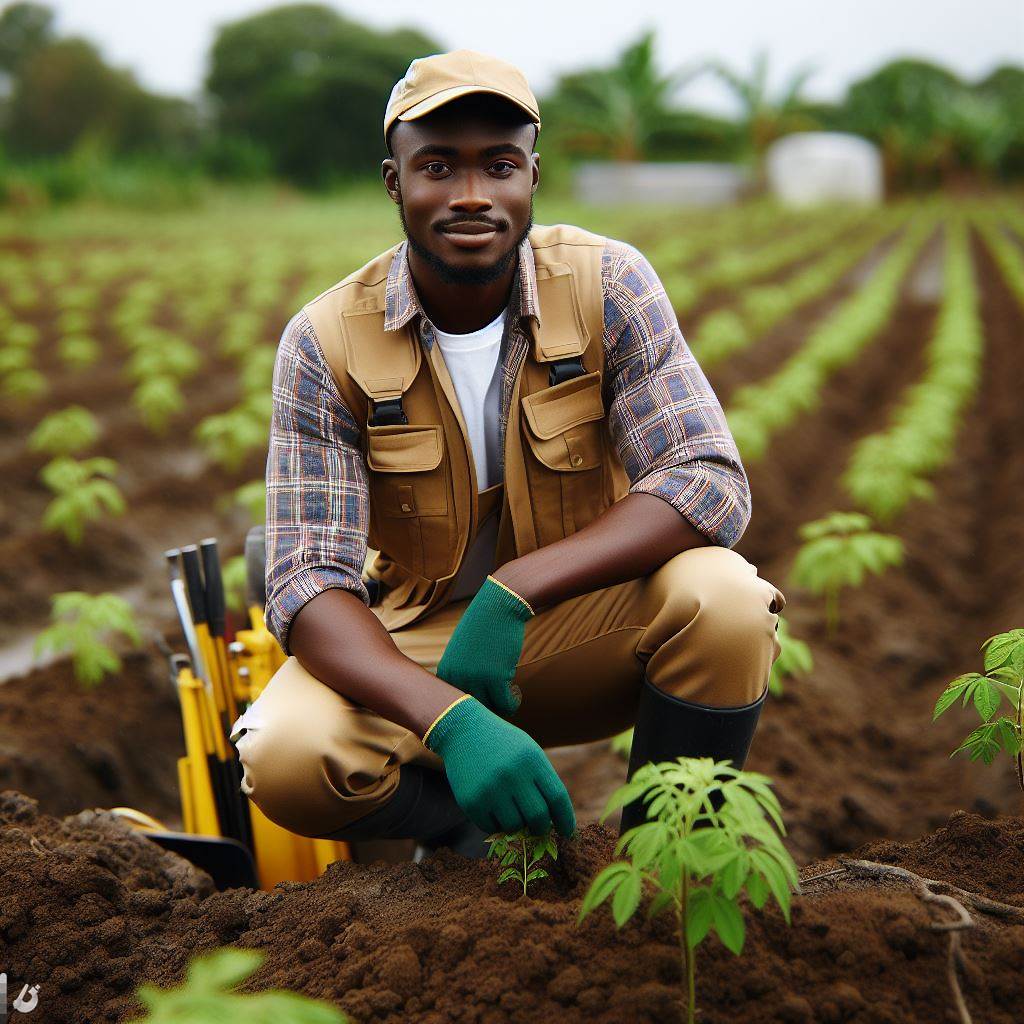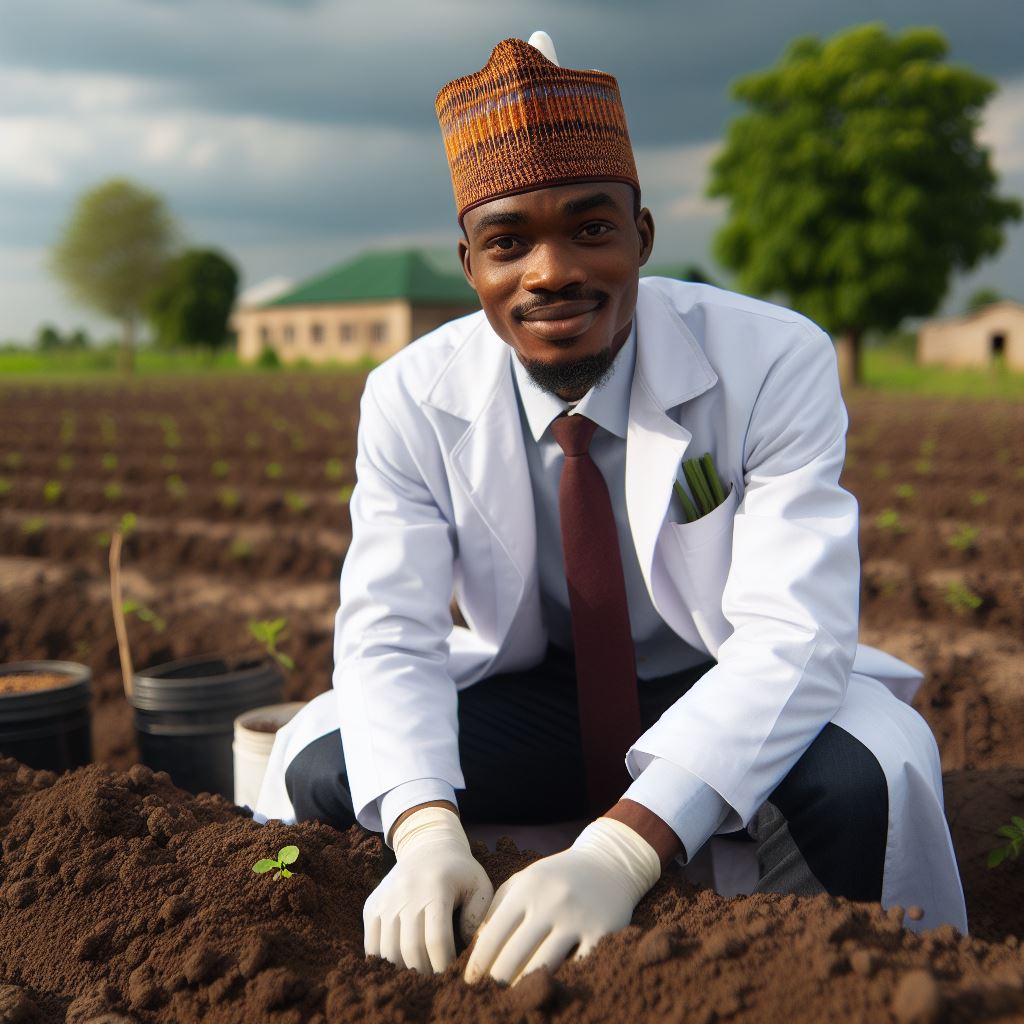Introduction
Crop protection, crucial in agriculture, shields crops from pests, diseases, and environmental hazards.
The significance of crop protection in agriculture cannot be overstated. It ensures food security, economic stability, and environmental sustainability.
Nigeria’s university system comprises federal, state, and private institutions, each contributing to education, research, and innovation.
Crop protection stands as a cornerstone in the realm of agriculture, guarding crops against various adversities.
Its significance transcends mere pest control; it encompasses a spectrum of measures ensuring the health and productivity of crops.
In the agricultural domain, crop protection assumes a pivotal role.
Its multifaceted nature involves employing methodologies to safeguard crops from detrimental influences such as pests, diseases, and environmental stressors.
Nigeria, a country with a diverse agricultural landscape, relies significantly on its university system to address agricultural challenges.
The Nigerian university system comprises federal, state-owned, and private institutions, fostering education, research, and innovation.
These universities play a vital role in shaping the future of crop protection through research endeavors, curriculum development, and practical application.
They equip aspiring agriculturalists with the necessary knowledge and skills to tackle emerging challenges in crop protection.
The importance of crop protection resonates deeply within Nigeria’s agricultural sector.
Universities serve as hubs of knowledge and innovation, contributing significantly to advancements in crop protection techniques and technologies.
Through academic programs, research initiatives, and collaborations with stakeholders, Nigerian universities propel the field of crop protection forward, aiming to ensure sustainable agricultural practices and food security for the nation.
The introduction of crop protection in Nigerian universities signifies a commitment to fortifying the agricultural sector, thereby fostering a resilient and prosperous future for the nation.
History of Crop Protection in Nigerian Universities
Emergence and Development of Crop Protection as a Discipline in Nigerian Universities
Crop protection has emerged as a vital discipline in Nigerian universities, focusing on safeguarding agricultural crops.
The development of this field has been driven by the need to enhance agricultural productivity and combat crop diseases.
Universities in Nigeria recognized the importance of crop protection and started establishing dedicated departments and research centers.
These departments focus on conducting research, providing academic programs, and offering professional training in crop protection.
Crop protection as a discipline has played a significant role in ensuring food security and sustainability in Nigeria.
Key Milestones and Influential Figures in the Field of Crop Protection
Prof. Adebayo Adedeji was one of the influential figures who pioneered crop protection in Nigerian universities.
His research and efforts led to the establishment of the first crop protection department in a Nigerian university.
Another key milestone was the introduction of integrated pest management techniques in crop protection.
This approach emphasized the use of various control methods to minimize the reliance on chemical pesticides.
Collaborations with international institutions and research centers have also contributed to advancing crop protection in Nigeria.
Integration of Crop Protection into Agriculture Curricula
The integration of crop protection into agriculture curricula has been prioritized by Nigerian universities.
Students pursuing agriculture-related degrees are now exposed to comprehensive courses in crop protection.
These courses cover topics such as pest identification, disease management, pesticide usage, and sustainable agriculture practices.
The integration of crop protection into agriculture curricula aims to produce skilled professionals in the field.
Graduates with expertise in crop protection contribute to the agricultural sector by addressing crop-related challenges and improving productivity.
In fact, crop protection has significantly evolved in Nigerian universities, with dedicated departments, influential figures, and integrated curricula.
This discipline plays a crucial role in ensuring food security, sustainable agriculture, and combatting crop diseases.
Read: Employability Stats: Crop Production Tech Graduates in Nigeria
Crop Protection Courses Offered in Nigerian Universities
Common crop protection courses offered in Nigerian universities
- Introduction to Crop Protection: This course provides an overview of crop diseases, pests, and weeds and their management strategies.
- Principles of Plant Pathology: Students learn about the identification, diagnosis, and control measures of plant diseases.
- Entomology: This course focuses on the study of insects and their impact on crop growth and development. Students learn intervention methods for insect control.
- Herbology: Students learn about weed identification, classification, and control strategies to prevent weed competition with crops.
- Pesticide Science and Application: This course equips students with knowledge of different pesticide classes, their usage, and safety guidelines for application.
- Integrated Pest Management: Students learn about sustainable crop protection techniques that minimize the use of pesticides and promote natural pest control methods.
The significance of these courses in developing expertise and skills
Crop protection courses provide students with in-depth knowledge about various aspects of crop diseases, pests, and weeds. They equip students with:
- A strong foundation in identifying and managing crop diseases, pests, and weeds.
- Skills in implementing effective intervention methods to protect crops from potential threats.
- Understanding of the impact of pests and diseases on crop yield and quality.
- Knowledge of sustainable practices that minimize environmental risks associated with crop protection.
- Ability to make informed decisions regarding the selection and application of pesticides.
Overall, these courses foster the development of expertise and skills necessary for ensuring optimal crop production and protection.
The relevance of crop protection courses to the Nigerian agricultural sector
Crop protection courses play a crucial role in the Nigerian agricultural sector by:
- Addressing the challenges posed by crop diseases, pests and weeds which can lead to significant yield losses.
- Equipping future agricultural professionals with the knowledge and skills needed to protect crops and improve productivity.
- Promoting sustainable agricultural practices that minimize the reliance on chemical pesticides.
- Enhancing food security and contributing to the country’s economy through increased crop production.
- Supporting advancements in crop protection research and innovation to address emerging threats.
The relevance of these courses is evident in their contribution to the overall growth and development of the Nigerian agricultural sector.
Read: Sustainability and Organic Farming in Nigerian Crop Science Curricula
Research and Innovation in Crop Protection
Key research initiatives and breakthroughs in crop protection within Nigerian universities
- Development of pest-resistant crop varieties through genetic modification.
- Enhancement of biological control agents for effective pest management.
- Investigation of alternative methods such as organic farming and integrated pest management.
- Evaluation of the efficacy of different pesticides and their impact on crops and the environment.
Impact of innovative technologies and approaches in addressing crop protection challenges
- Introduction of drones for monitoring and early detection of pests and diseases.
- Utilizing remote sensing and satellite imagery to assess crop health and vulnerability.
- Adoption of precision agriculture techniques for targeted application of pesticides.
- Incorporation of smart farming technologies to optimize water and fertilizer use.
Notable ongoing research projects in the field
- Development of biopesticides using locally available botanicals and microorganisms.
- Exploration of nanotechnology-based solutions for targeted delivery of pesticides.
- Investigation of the influence of climate change on pest dynamics and crop vulnerability.
- Study of the potential use of natural enemies to control pests in greenhouse cultivation.
- Assessment of the effectiveness of pheromone-based traps in preventing insect infestations.
Read: Postgraduate Opportunities in Crop Production Technology

Collaboration and Partnerships
In the field of crop protection, Nigerian universities have actively formed collaborations with various external organizations.
Transform Your Career with Expert Guidance
Get personalized mentorship consulting that’s tailored to your unique path. Our expert advice is actionable and exclusive.
Get StartedThese partnerships have proven to be beneficial for both parties involved, allowing for knowledge sharing and resource mobilization.
Collaborations between Nigerian universities and external organizations in crop protection
Nigerian universities have established partnerships with governmental bodies such as the Nigerian Agricultural Quarantine Service (NAQS) and the National Agency for Food and Drug Administration and Control (NAFDAC).
These collaborations aim to develop and implement effective strategies for crop protection.
Furthermore, Nigerian universities have also collaborated with international organizations.
The International Institute of Tropical Agriculture (IITA) has worked closely with Nigerian universities to conduct research on crop protection and trainings for farmers.
Benefits of partnerships for knowledge sharing and resource mobilization
The collaborations between Nigerian universities and external organizations have facilitated the exchange of knowledge and expertise.
Through these partnerships, researchers and scientists from both sides have been able to share their findings, techniques, and innovations in crop protection, leading to advancements in the field.
Moreover, partnerships have enabled the efficient mobilization of resources.
External organizations often provide financial support, equipment, and access to specialized facilities, which are crucial for conducting research on crop protection.
This helps Nigerian universities overcome resource limitations and enhance their capabilities in this field.
Examples of successful collaborative projects or programs
One notable example is the partnership between Ahmadu Bello University and NAQS.
Together, they developed a comprehensive program for pest management in agricultural systems.
This collaborative effort resulted in the successful implementation of sustainable and environmentally-friendly pest control measures across various crops in Nigeria.
The collaboration between the University of Ibadan and IITA led to the creation of a joint research center for crop protection.
This center has contributed immensely to the development of innovative solutions for crop diseases and pests in Nigeria, benefiting farmers and improving food security.
Another successful collaborative project is the partnership between the Federal University of Agriculture, Abeokuta and NAFDAC.
This collaboration focused on the regulation and control of agrochemicals, ensuring the safe and responsible use of pesticides in Nigerian agriculture.
The joint efforts have resulted in more effective and sustainable crop protection practices.
In short, collaborations between Nigerian universities and external organizations in the field of crop protection have proven to be advantageous.
These partnerships foster knowledge sharing, resource mobilization, and the successful implementation of innovative projects and programs.
By working together, Nigerian universities and external organizations contribute to the development of sustainable crop protection practices in Nigeria, ultimately benefiting the agricultural sector and ensuring food security.
Read: Postgraduate Opportunities in Crop Science in Nigeria
Challenges and Opportunities in Crop Protection Education
Common Challenges in Delivering Quality Crop Protection Education
- Insufficient funding for research and infrastructure development.
- Lack of updated teaching materials and laboratory equipment.
- Shortage of qualified and experienced faculty members.
- Inadequate collaboration between universities and industry.
- Low societal recognition and value for agricultural sciences.
Strategies to Address Challenges and Improve the Field
- Increase funding allocation for agricultural research and infrastructure in Nigerian universities.
- Establish partnerships with international organizations and industry experts to facilitate knowledge exchange.
- Provide training and professional development opportunities for faculty members.
- Develop and implement industry-relevant curriculum and practical training programs.
- Enhance collaboration between universities, agricultural agencies, and the private sector.
Opportunities and Potential for Growth in Crop Protection Education
- Rising global demand for food and the need for sustainable agricultural practices.
- Advancements in technology, such as precision agriculture and remote sensing, create new avenues for research and practical applications.
- Increasing government support for agricultural sector development and capacity building.
- Growing interest among students in pursuing careers in crop protection and related fields.
- Potential for collaboration and knowledge exchange with international universities and research institutions.
In general, Nigerian universities face various challenges in delivering quality crop protection education, but there are potential strategies to address these issues and improve the field.
By increasing funding, establishing partnerships, providing training opportunities, and enhancing collaboration, universities can overcome obstacles and ensure the growth and development of crop protection education.
The opportunities for growth, including rising global demand for food, technological advancements, government support, student interest, and international collaboration, provide a promising future for crop protection education in Nigeria.
Conclusion
Crop protection within Nigerian universities serves as the bedrock for sustainable agriculture.
The knowledge and research generated in these academic institutions play a vital role in shaping agricultural practices, combating crop diseases, optimizing pest management strategies, and promoting environmentally friendly approaches.
Throughout this post, we’ve stressed the critical role of crop protection in sustaining Nigeria’s agricultural sector.
Crop diseases, pests, climate change, and other factors continually threaten crop productivity.
Hence, the need for concerted efforts within universities to train skilled professionals, conduct research, and develop solutions that mitigate these challenges.
Crop protection in Nigerian universities is indispensable.
It serves as a catalyst for innovation and progress in agriculture, ensuring food security, economic stability, and environmental conservation.
This chapter aimed to provide a concise overview of the importance of crop protection in Nigerian universities.
However, there remains a vast field to explore and understand.
I encourage you to continue your exploration, tapping into resources such as academic journals, seminars, workshops, and collaborations within the academic community.
Let’s join hands to foster a sustainable future for agriculture in Nigeria.
Your interest, engagement, and dedication to crop protection will contribute significantly to the advancement of agricultural practices and the well-being of communities reliant on these crucial resources.




